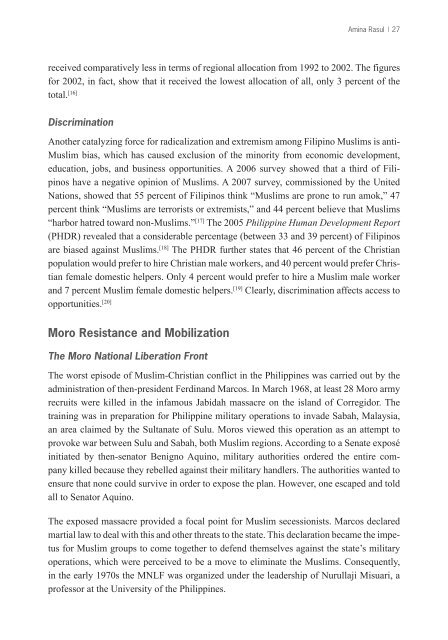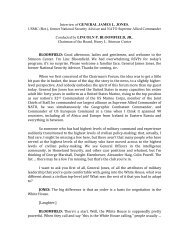Islam and Politics - The Stimson Center
Islam and Politics - The Stimson Center
Islam and Politics - The Stimson Center
You also want an ePaper? Increase the reach of your titles
YUMPU automatically turns print PDFs into web optimized ePapers that Google loves.
Amina Rasul | 27<br />
received comparatively less in terms of regional allocation from 1992 to 2002. <strong>The</strong> figures<br />
for 2002, in fact, show that it received the lowest allocation of all, only 3 percent of the<br />
total. [16]<br />
Discrimination<br />
Another catalyzing force for radicalization <strong>and</strong> extremism among Filipino Muslims is anti-<br />
Muslim bias, which has caused exclusion of the minority from economic development,<br />
education, jobs, <strong>and</strong> business opportunities. A 2006 survey showed that a third of Filipinos<br />
have a negative opinion of Muslims. A 2007 survey, commissioned by the United<br />
Nations, showed that 55 percent of Filipinos think “Muslims are prone to run amok,” 47<br />
percent think “Muslims are terrorists or extremists,” <strong>and</strong> 44 percent believe that Muslims<br />
“harbor hatred toward non-Muslims.” [17] <strong>The</strong> 2005 Philippine Human Development Report<br />
(PHDR) revealed that a considerable percentage (between 33 <strong>and</strong> 39 percent) of Filipinos<br />
are biased against Muslims. [18] <strong>The</strong> PHDR further states that 46 percent of the Christian<br />
population would prefer to hire Christian male workers, <strong>and</strong> 40 percent would prefer Christian<br />
female domestic helpers. Only 4 percent would prefer to hire a Muslim male worker<br />
<strong>and</strong> 7 percent Muslim female domestic helpers. [19] Clearly, discrimination affects access to<br />
opportunities. [20]<br />
Moro Resistance <strong>and</strong> Mobilization<br />
<strong>The</strong> Moro National Liberation Front<br />
<strong>The</strong> worst episode of Muslim-Christian conflict in the Philippines was carried out by the<br />
administration of then-president Ferdin<strong>and</strong> Marcos. In March 1968, at least 28 Moro army<br />
recruits were killed in the infamous Jabidah massacre on the isl<strong>and</strong> of Corregidor. <strong>The</strong><br />
training was in preparation for Philippine military operations to invade Sabah, Malaysia,<br />
an area claimed by the Sultanate of Sulu. Moros viewed this operation as an attempt to<br />
provoke war between Sulu <strong>and</strong> Sabah, both Muslim regions. According to a Senate exposé<br />
initiated by then-senator Benigno Aquino, military authorities ordered the entire company<br />
killed because they rebelled against their military h<strong>and</strong>lers. <strong>The</strong> authorities wanted to<br />
ensure that none could survive in order to expose the plan. However, one escaped <strong>and</strong> told<br />
all to Senator Aquino.<br />
<strong>The</strong> exposed massacre provided a focal point for Muslim secessionists. Marcos declared<br />
martial law to deal with this <strong>and</strong> other threats to the state. This declaration became the impetus<br />
for Muslim groups to come together to defend themselves against the state’s military<br />
operations, which were perceived to be a move to eliminate the Muslims. Consequently,<br />
in the early 1970s the MNLF was organized under the leadership of Nurullaji Misuari, a<br />
professor at the University of the Philippines.

















